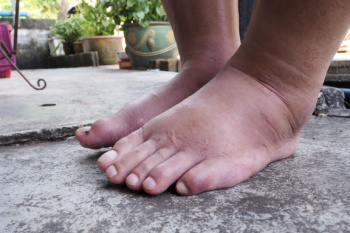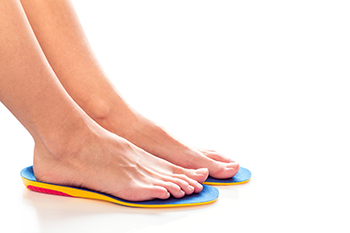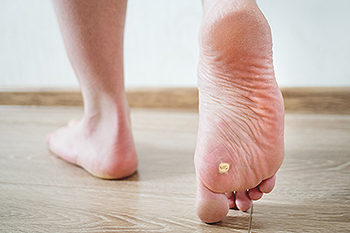Connect With Us
Blog
Items filtered by date: September 2024
Lymphedema in the Feet Is More Than Just Swelling

Lymphedema in the feet occurs when lymph fluid builds up in the tissues, causing swelling. This condition results from a blockage or damage in the lymphatic system, which is responsible for draining excess fluid from tissues and returning it to the bloodstream. Lymphedema can be caused by infections, surgery, radiation treatment for cancer, or congenital conditions where the lymphatic system is underdeveloped. People at a higher risk include those who have undergone cancer treatments, have had lymph node removal, or suffer from chronic venous insufficiency. Treatment focuses on managing the swelling and improving lymph drainage. Compression therapy, such as wearing specialized stockings, is commonly used. Manual lymph drainage, a specialized massage technique used by a podiatrist, can help reduce swelling. If your feet are swollen and you are not clear on the cause, it is strongly suggested that you see a podiatrist for a proper diagnosis and care.
Some foot conditions may require additional professional care. If you have any concerns, contact one of our podiatrists of New Jersey. our doctors can provide the care you need to keep you pain-free and on your feet.
Rare Foot Conditions
The majority of foot conditions are common and can be treated by a podiatrist. Standard diagnostic procedures are generally used to identify specific conditions and treatment can be rendered. A podiatrist also treats rare foot conditions which can be difficult to diagnose and may need extra attention and care.
There are many rare foot conditions that can affect children. Some of these can include:
- Freiberg’s disease
- Kohler’s disease
- Maffucci syndrome
Freiberg’s disease - This can be seen as a deterioration and flattening of a metatarsal bone that exists in the ball of the foot. It typically affects pre-teen and teenage girls, but can affect anyone at any age. Symptoms that can accompany this can be swelling, stiffness, and the patient may limp.
Kohler’s disease - This often targets the bone in the arch of the foot and affects younger boys. It can lead to an interruption of the blood supply which ultimately can lead to bone deterioration. The patient may limp or experience tenderness, swelling, and redness.
Maffucci syndrome - This affects the long bones in a child’s foot leading to the development of abnormal bone lesions. They are benign growths and typically develop in early childhood and the bones may be susceptible to breaking.
A podiatrist can properly diagnose and treat all types of rare foot conditions. If your child is affected by any of these symptoms or conditions, please don’t hesitate to call our office so the correct treatment method can begin.
If you have any questions please feel free to contact our office located in Neptune City, NJ . We offer the newest diagnostic tools and technology to treat your foot and ankle needs.
Orthotics for Rigid Big Toe

Shoe orthotics are an important non-surgical treatment for hallux rigidus, a condition marked by a stiff, painful big toe joint. Before considering surgery, it is wise to explore orthotic options, as they can significantly alleviate symptoms and improve mobility. Custom-made orthotics help by redistributing pressure away from the affected joint, providing better arch support, and reducing pain during movement. They work by cushioning the foot and correcting abnormal gait patterns that worsen the condition. If you have a painful and stiff big toe, it is suggested that you consult a podiatrist to ensure that the orthotics are tailored to your specific needs.
If you are having discomfort in your feet and would like to try orthotics, contact one of our podiatrists from New Jersey. our doctors can provide the care you need to keep you pain-free and on your feet.
What Are Orthotics?
Orthotics are inserts you can place into your shoes to help with a variety of foot problems such as flat feet or foot pain. Orthotics provide relief and comfort for minor foot and heel pain but can’t correct serious biomechanical problems in your feet.
Over-the-Counter Inserts
Orthotics come in a wide variety of over-the-counter inserts that are used to treat foot pain, heel pain, and minor problems. For example, arch supports can be inserted into your shoes to help correct overarched or flat feet, while gel insoles are often used because they provide comfort and relief from foot and heel pain by alleviating pressure.
Prescription Orthotics
If over-the-counter inserts don’t work for you or if you have a more severe foot concern, it is possible to have your podiatrist prescribe custom orthotics. These high-quality inserts are designed to treat problems such as abnormal motion, plantar fasciitis, and severe forms of heel pain. They can even be used to help patients suffering from diabetes by treating foot ulcers and painful calluses and are usually molded to your feet individually, which allows them to provide full support and comfort.
If you are experiencing minor to severe foot or heel pain, it’s recommended to speak with your podiatrist about the possibilities of using orthotics. A podiatrist can determine which type of orthotic is right for you and allow you to take the first steps towards being pain-free.
If you have any questions please contact our office located in Neptune City, NJ . We offer the newest diagnostic and treatment technologies for all your foot and ankle needs.
Non-Diabetic Foot Ulcers

Non-diabetic foot ulcers are open sores or wounds that occur on the feet, typically due to poor circulation, pressure, or injury. Unlike diabetic ulcers, these wounds are not directly caused by high blood sugar levels, but can still lead to severe complications if left untreated. These ulcers often develop from pressure points on the feet, especially in individuals with limited mobility or poor blood flow. Risk factors include age, obesity, peripheral artery disease, and wearing ill-fitting shoes. Recognizing a foot ulcer early is important. Look for persistent redness, swelling, and an open sore that does not heal. To prevent these ulcers, regularly inspect your feet, wear appropriate footwear, and manage any underlying conditions that affect circulation. Treatment involves cleaning the wound, relieving pressure with specialized footwear, and possibly using topical medications. If you notice you have developed a foot ulcer, it is suggested that you visit a podiatrist who can assess the ulcer's severity, provide targeted treatments, and suggest preventive strategies to avoid recurrence, ensuring optimal foot health.
Wound care is an important part in dealing with diabetes. If you have diabetes and a foot wound or would like more information about wound care for diabetics, consult with one of our podiatrists from New Jersey. our doctors will assess your condition and provide you with quality foot and ankle treatment.
What Is Wound Care?
Wound care is the practice of taking proper care of a wound. This can range from the smallest to the largest of wounds. While everyone can benefit from proper wound care, it is much more important for diabetics. Diabetics often suffer from poor blood circulation which causes wounds to heal much slower than they would in a non-diabetic.
What Is the Importance of Wound Care?
While it may not seem apparent with small ulcers on the foot, for diabetics, any size ulcer can become infected. Diabetics often also suffer from neuropathy, or nerve loss. This means they might not even feel when they have an ulcer on their foot. If the wound becomes severely infected, amputation may be necessary. Therefore, it is of the upmost importance to properly care for any and all foot wounds.
How to Care for Wounds
The best way to care for foot wounds is to prevent them. For diabetics, this means daily inspections of the feet for any signs of abnormalities or ulcers. It is also recommended to see a podiatrist several times a year for a foot inspection. If you do have an ulcer, run the wound under water to clear dirt from the wound; then apply antibiotic ointment to the wound and cover with a bandage. Bandages should be changed daily and keeping pressure off the wound is smart. It is advised to see a podiatrist, who can keep an eye on it.
If you have any questions, please feel free to contact our office located in Neptune City, NJ . We offer the newest diagnostic and treatment technologies for all your foot care needs.
Plantar Warts and Effective Relief Methods

Plantar warts are benign growths that appear on the soles of the feet due to an infection from the human papillomavirus, or HPV. They can cause discomfort and pain, making walking or standing difficult. These warts have a rough texture and can sometimes contain tiny black dots, which are small blood vessels. Various relief methods are available for those suffering from plantar warts. Mild treatments often include salicylic acid, which helps to peel away the wart gradually. Cryotherapy, which involves freezing the wart with liquid nitrogen, is another common approach. For persistent or severe cases, a podiatrist may recommend procedures like laser therapy or minor surgical removal. Plantar warts, which are both highly contagious and stubborn, can cause extreme pain and discomfort. If you have developed this type of wart, it is suggested that you consult a podiatrist who can offer you effective relief and treatment methods.
Plantar warts can be very uncomfortable. If you need your feet checked, contact one of our podiatrists from New Jersey. our doctors will assist you with all of your foot and ankle needs.
About Plantar Warts
Plantar warts are the result of HPV, or human papillomavirus, getting into open wounds on the feet. They are mostly found on the heels or balls of the feet.
While plantar warts are generally harmless, those experiencing excessive pain or those suffering from diabetes or a compromised immune system require immediate medical care. Plantar warts are easily diagnosed, usually through scraping off a bit of rough skin or by getting a biopsy.
Symptoms
- Lesions on the bottom of your feet, usually rough and grainy
- Hard or thick callused spots
- Wart seeds, which are small clotted blood vessels that look like little black spots
- Pain, discomfort, or tenderness of your feet when walking or standing
Treatment
- Freezing
- Electric tool removal
- Laser Treatment
- Topical Creams (prescription only)
- Over-the-counter medications
To help prevent developing plantar warts, avoid walking barefoot over abrasive surfaces that can cause cuts or wounds for HPV to get into. Avoiding direct contact with other warts, as well as not picking or rubbing existing warts, can help prevent the further spread of plantar warts. However, if you think you have developed plantar warts, speak to your podiatrist. He or she can diagnose the warts on your feet and recommend the appropriate treatment options.
If you have any questions please feel free to contact our office located in Neptune City, NJ . We offer the newest diagnostic and treatment technologies for all your foot and ankle needs.
